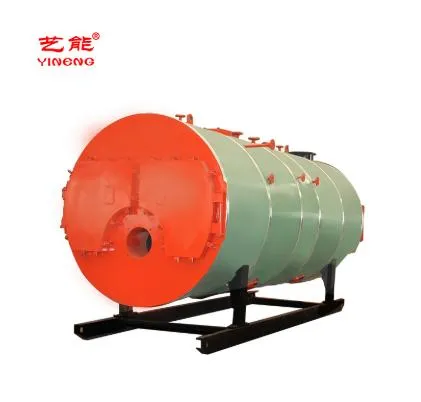Industrial Water Boiler: The Source Of Power For Industrial Production
Industrial Water Boiler, As a key equipment that converts fuel or other energy into heat energy, transfers the heat energy to water, and ultimately produces hot water or steam, it plays an indispensable role in modern industrial production. From power generation, chemical industry, textile to food processing, almost all industrial sectors cannot do without the thermal energy provided by Industrial Water Boiler. It can be said that it is the "source of power" for modern industry.

The core function of Industrial Water Boiler is to convert chemical energy into thermal energy, which in turn heats water
The basic structure of a high efficiency hot water boiler typically includes a furnace, combustion system, heating surface, steam water separation equipment, and control system. The combustion of fuel in the furnace releases a large amount of heat, which is transferred to the water in the boiler through the heating surface, causing its temperature to rise until boiling, producing hot water or steam. The generated hot water or steam is transported through pipelines to various heating equipment, providing necessary energy for industrial production.
According to different types of fuel, Industrial Water Boilers can be divided into various types such as coal-fired boilers, oil fired boilers, gas boilers, and biomass boilers
Portable water heater boiler is the oldest type of boiler in history, with the advantage of relatively low fuel costs but also serious pollution. Oil fired boilers and gas fired boilers have the advantages of high combustion efficiency and high degree of automation, but the fuel cost is relatively high. Biomass boilers utilize renewable biomass fuels, which have the advantages of environmental protection and energy conservation, but their fuel sources and combustion stability still need to be further improved.
With the increasing demand for environmental protection in society, the design and operation of pressure hot water boilers are also facing more severe challenges. Traditional coal-fired boilers require desulfurization, denitrification, dust removal and other treatments to reduce pollutant emissions. New boilers pay more attention to energy conservation and environmental protection, such as using condensing boiler technology to recover heat from flue gas and improve the thermal efficiency of the boiler. In addition, intelligent control systems are becoming increasingly popular, which can monitor the operating status of boilers in real time, optimize the combustion process, improve energy utilization efficiency, and reduce operating costs.
In the future, the development trend of Industrial Water Boiler will pay more attention to efficiency, energy conservation, environmental protection, and intelligence
On the one hand, the structural design of the steam water boiler will be further optimized, adopting more advanced combustion and heat exchange technologies to improve the thermal efficiency of the boiler. On the other hand, the selection of fuels will be more diversified, including natural gas, biomass, and other renewable energy sources, to reduce dependence on fossil fuels. At the same time, the application of intelligent control systems will become more widespread, enabling automated operation and remote monitoring of boilers, and improving management efficiency.
In summary, as an indispensable energy supply equipment in industrial production, the development of Industrial Water Boiler is closely related to industrial development. Under the dual pressure of energy shortage and environmental pollution, the continuous improvement and innovation of Industrial Water Boiler will provide important guarantees for the sustainable development of industrial production.
Industrial Water Boiler FAQs
What is the main purpose of Industrial Water Boiler?
Industrial Water Boiler is mainly used to provide stable, high-temperature hot water or low-pressure steam for industrial production processes, suitable for fields such as chemical, textile, food processing, pharmaceutical, HVAC, etc. Common uses include process heating, equipment cleaning, sterilization and disinfection, factory heating, etc.
What are the common types of Industrial Water Boilers?
Industrial Water Boiler can be divided into gas boilers, oil fired boilers, electric boilers, coal-fired boilers, and biomass boilers according to fuel; According to structure, it can be divided into vertical boilers and horizontal boilers; According to the operating mode, it can be divided into atmospheric pressure boilers and pressure boilers. When choosing, factors such as fuel cost, environmental requirements, and thermal efficiency should be considered.
How can Industrial Water Boiler improve thermal efficiency?
The key measures to improve the thermal efficiency of Industrial Water Boiler include optimizing the combustion system (such as fully premixed combustion technology), adopting condensation waste heat recovery devices, strengthening boiler insulation to reduce heat loss, regularly cleaning scale and soot, and using variable frequency control water pumps and fans to match load demand.
What are the common problems encountered during the operation of Industrial Water Boiler?
Common issues include scale accumulation (reducing heat transfer efficiency), corrosion (affecting boiler life), insufficient combustion (leading to fuel waste and excessive emissions), unstable pressure (potentially causing safety hazards), and control system failures (such as sensor failure or PLC failure).
How to ensure the safe operation of Industrial Water Boiler?
To ensure safe operation, the following measures need to be taken: regular inspection of safety valves, pressure gauges, and water level gauges; Strictly implement water quality management (softened water treatment+regular discharge); Install automatic alarm and interlock protection systems (such as low water level protection, over temperature protection); Operators must hold certificates and receive safety training before taking up their posts; Comply with the national special equipment safety supervision regulations (such as regular annual inspections).
-
Hebei Yineng Boiler will attend Shoes & Leather Exhibition- Vietnam 2025AktualnościJul.01,2025
-
Understanding Waste Heat Boilers: Revolutionizing Energy EfficiencyAktualnościJun.24,2025
-
Industrial Hot Water Boiler: The Backbone of Efficiency and ReliabilityAktualnościJun.24,2025
-
Industrial Hot Oil Heater: The Ultimate Solution for Your Thermal NeedsAktualnościJun.24,2025
-
Horizontal Steam Boiler: The Optimal Solution for Industrial ApplicationsAktualnościJun.24,2025
-
Electric Steam Boiler for Industrial UseAktualnościJun.24,2025

